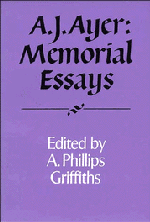Book contents
- Frontmatter
- Contents
- Preface
- A Defence of Empiricism
- Ayer: the Man, the Philosopher, the Teacher
- Ayer's Place in the History of Philosophy
- AYER'S ATTACK ON METAPHYSICS
- Ayer and World Views
- Language, Newspeak and Logic
- On the relation between Common Sense, Science and Metaphysics
- Logical Positivism and Intentionality
- Probability and the Evidence of our Senses
- Seeing Qualia and Positing the World
- Three Varieties of Knowledge
- The Importance of ‘If’
- Ayer's Ethical Theory: Emotivism or Subjectivism?
- Subjectivism and Toleration
- An Interview with A. J. Ayer
- Notes on Contributors
- References
- Index
Probability and the Evidence of our Senses
Published online by Cambridge University Press: 01 July 2010
- Frontmatter
- Contents
- Preface
- A Defence of Empiricism
- Ayer: the Man, the Philosopher, the Teacher
- Ayer's Place in the History of Philosophy
- AYER'S ATTACK ON METAPHYSICS
- Ayer and World Views
- Language, Newspeak and Logic
- On the relation between Common Sense, Science and Metaphysics
- Logical Positivism and Intentionality
- Probability and the Evidence of our Senses
- Seeing Qualia and Positing the World
- Three Varieties of Knowledge
- The Importance of ‘If’
- Ayer's Ethical Theory: Emotivism or Subjectivism?
- Subjectivism and Toleration
- An Interview with A. J. Ayer
- Notes on Contributors
- References
- Index
Summary
Our knowledge of the world comes to us, one way or another, through our senses. I know there's a table here, because I see it, and that there's traffic outside, because I hear it. And similarly for our other senses. I know when it's cold, because I feel it; when there's sugar in my tea, because I taste it; smoke in the air, because I smell it; and so on.
The knowledge we get directly from our senses in this way is of course only a small part of what we know about the world. Most of our knowledge depends also on memory. It is not my senses that are now telling me what I saw yesterday: my knowledge of that comes from my memory of what I saw then. Then again there are many things I know—about Queen Victoria, for example—not because I am seeing, hearing or remembering them, but because I have been told about them. Most of our knowledge of history comes not from our own observation of historical events, but from professional historians; just as most of our knowledge of science, whether of microphysics, biology or cosmology, comes from professional scientists.
But all this knowledge still comes in the end through people's senses. My second-hand knowledge of history and science comes through my senses: through my hearing what historians and scientists say or seeing what they write. And their first-hand knowledge comes through their senses: from what they see written in historical documents, or by means of scientific instruments such as microscopes and telescopes.
- Type
- Chapter
- Information
- A. J. Ayer: Memorial Essays , pp. 117 - 128Publisher: Cambridge University PressPrint publication year: 1992

